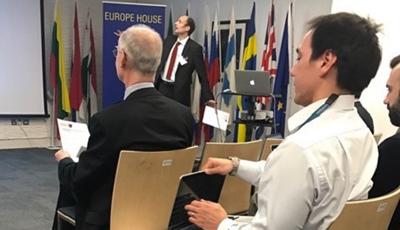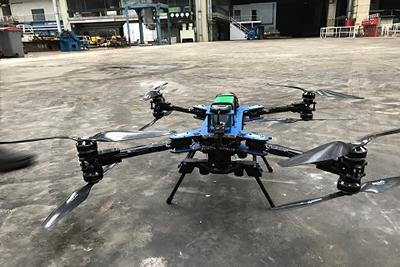H2020 RAS briefing event in London -an overview

The H2020 Robotics & Autonomous Systems Briefing Event, organised by The Knowledge Transfer Network, aimed to provide a briefing on RAS Research & Innovation funding opportunities under the LEIT-ICT Workprogramme 2016-2017, with a focus on the following currently open RAS Topics closing on the 25th April 2017:-
ICT-25-2016-2017: Advanced robot capabilities research and take-up [Budget 34 MEUR]
ICT-27-2017: System abilities, SME and benchmarking actions, safety certification [Budget 41 MEUR]
ICT-28-2017: Robotics Competition, coordination and support [Budget 5 MEUR]
The meeting featured presentations on the scope and conditions for applying to the above H2020 topics as well as on the SPARC Public-Private Partnership (PPP) in Robotics. The objective of the PPP is to provide a platform for the industrial and academic community to develop a common roadmap for robotics in Europe and to identify the means to realise this roadmap with public support. Some RAS case studies were also presented which reflected the experience of participating and working in collaborative R&I projects.
Agenda
12:00 Registration and Networking Lunch
13:00 Welcome & Introduction
13:10 RAS Topics 2017
13:50 SPARC PPP & WP 2018-2020
14:10 Q&A 14:25 H2020 Project X
14:45 H2020 Project Y
15:05 Q&A
15:15 Process and Practicalities
15:30 Tea/Coffee and networking
16:00 Reflections from IUK's RAS Competition
16:20 Industrial case study
16:45 Networking
17:00 Disperse
Autonomous Systems members, Dr Blair Thornton and Dr Chang Liu attended the event. The speakers included:
Juha Heikkila - DG Connect, Unit A.1 Robotics and Artificial Intelligence; David Bisset - iTechnic Ltd; Geoff Pegman - RURobot; Professor Loannis Pitas - University of Bristol and from Innovate UK, George Papadakis (Innovate UK, NCP ICT & FET) and Nikos Pronios (Innovate UK, Innovation Lead on RAS).
The three main themes of the fourth H2020 RAS call, which closes on 25 April 2017are:
- Research & Innovation Actions (RIA): Basic research is necessary but the proposal needs to have real world capability.
- Advance robotic capabilities & take up: The product needs to have above a level 5 technology readiness level (TRL).
- ICT-27-2017 System abilities, SME & Benchmarking, safety certification: with particular interest in smart city (€ 5-7 million funding available for pre-commercial procurement and robotic competitions)
Further resources can be found here.
News from SPARC PPP for Work Programme 2018-2020 (ICT-2017):- The funding is looking for technologies for step changing impact, by which they mean a multiplicative improvement in technical capability or a categorical step in capability. The system abilities they are interested in are adaptability, motion ability, manipulation ability, decisional autonomy, cognitive ability, perception ability, interaction ability, dependability and configurability.

The meeting heard about some successful case studies involving RURobot: the ‘MARIO’ robotic healthcare project, and the ‘UnCoVerCPS’ robotic cyberphysical system project. Geoff Pegman gave some useful tips for making a successful project proposal:
- It needs to be closely coupled and highly integrated with a common style of working and strong global project management.
- It could also be loosely coupled sub-projects aimed at same goal.
- Form consortia as early as possible.
- Only undertake projects that meet your own organisation’s goals.
- Check on the delivery partner.
Professor Loannis Pitas presented his newly funded H2020 project ‘MULTIDRONE’, which is a live sports aerial broadcasting project using a fleet of autonomous drones.
From INnovate UK the meeting heard all about the process and practicalities of the bid application withthe following recommendations:
projects must be business-led
must involve at least one SME
must range in size from total costs of £50k to £500k
must last between 6 to 15 months with cost up to £100k for a single company (costs over £100k must be collaborative)
must complete the work, pay and claim for all costs before the end of March 2018.